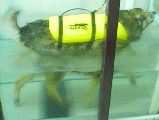Veterinarians & Pet Related Things
for PWC owners of Pets and for
Pets with CFS like problems
VETERINARIANS
Heathy P.A.W.S Medical Center (703) 754-4146
Rebecca Verna DVM
14840 Washington St
Haymarket VA 20169
info@healthypawsvet.com
Integrative medical clinic for pets.
Dr. Verna offers acupuncture, chinese herbs, reiki, and more.
Practice offers Rehabilitative Hydrotherapy (RHT) for Dogs.
(Two of our members took their dogs for RHT)
http://www.healthypawsvet.com/
Ken Wright DVM (703) 444-1666
Countryside Animal Clinic
113 Edds Lane
Sterling VA 20165
"was accepting when a CFS patient caught something from a pet, not usually transmitted."
HOPE Center for Advanced Veterinary Medicine & Emergency Animal Hospital (703) 281-5121
Vienna, VA
http://www.hopecenter.com/
"Fast, successful care - reduced my stress level!" - a CFSupport member
DOG REHABILITATIVE HYDROTHERAPY (RHT)
 Tazz Brosius in the tank! Tazz Brosius in the tank!
Heathy P.A.W.S Medical Center (703) 754-4146
Rehabilitative Hydrotherapy for Dogs.
14840 Washington St
Haymarket VA 20169
info@healthypawsvet.com
(Two of our members take their dogs for RHT - walking on a treadmill in a water tank with life jacket on!)
http://www.healthypawsvet.com/
PET ALLERGISTS / DERMATOLOGISTS
James Jeffers DVM (301) 977-9169
Board Certified Veterinary Dermatologist
Animal Allergy & Dermatology Clinic
9039 Gaither Rd
Gaithersburg MD 20877
http://www.aadconline.com/
PETS with CFS
Walter Tarello, Veterinary Surgeon has written several articles about CFS in Animals, see
Abnormal Signs Found in Animals of Myalgic Encephalomyelitis/ Chronic Fatigue Syndrome Patients:
A Look at 463 Animals
R. Tom Glass, Professor, Pathology, Oklahoma State University
Objective: To evaluate the
abnormal signs found in the domestic animals (pets) of Myalgic
Encephalomyelitis/ Chronic Fatigue Syndrome (ME/CFS) patients.
Design: Retrospective study of the domestic animals (pets)
of criteriamet ME/CFS patients using a standardized questionnaire which
included patient comments.
Setting: University medical center and ME/CFS support
groups throughout the United States. Patients: A total of 127 patients
met the surveillance criteria of the Centers for Disease Control and
Prevention (CDC) for the establishment of the diagnosis of ME/CFS and
were included in the study. This group of patients had a total of 463
domestic animals (pets), of which 348 animals demonstrated abnormal
signs and 115 were considered healthy.
Measurements: Information from the standardized
questionnaire was compiled and appropriate statistical tests, including
mean, median, Z test, multivariant analysis, and Chi-square test, were
used.
Results: One hundred six (83%) of the 127 ME/CFS surveyed
reported that at least one of their animals (predominantly domestic
pets) showed a wide range of unusual or atypical signs, many of which
mimicked the signs and symptoms of ME/CFS. The sick animals' signs were
divided into General (40%), Neurological (35%), Gastrointestinal (10%),
Reticuloendothelial/Blood (9%), Neoplasia (4%), and Endocrine (2%). One
of the most striking result of the study was that 113 of the 127 ME/CFS
patients surveyed felt their ME/CFS symptoms were somehow associated
with their animals contact. Ninety (71%) of the 127 ME/CFS patients
reported that they were the primary caretakers for multiple animals.
Other less common findings were: the onset of ME/ CFS being associated
with obtaining the animal; the onset of ME/CFS being associated with a
flea bite episode; prior residents having sick animals and ME/CFS;
other family member contracting ME/CFS from their close association
with the sick animal (as opposed to their association with the family
members who had ME/CFS); ME/CFS symptoms decreasing after the pet
leaving or dying.
Conclusions: A large number of animals of ME/CFS patients
have atypical or unusual diseases which at least mimic ME/CFS. Most of
the 127 ME/CFS patients surveyed have significant animal interactions.
Journal Title:
Journal of Chronic Fatigue Syndrome:
Multidisciplinary Innovations in Research, Theory, and Clinical Practice
Volume: 6 Issue: 2
ISSN: 1057-3321 Pub Date: 6/1/1998
Veterinary Testing for Chronic Infections
Scientists and physicians
at the Institute for Molecular Medicine have been working with
veterinarians who have patients of various species with undiagnosed
illnesses, in some cases similar to their owners who have Chronic
Fatigue Syndrome (CFS), Fibromyalgia Syndrome (FMS), Gulf War Illness
(GWI) or Rheumatoid Arthritis (RA). We have determined that a
connection exists between the above chronic illnesses suffered by
humans and chronic infections caused by Mycoplasma, Chlamydia, Borrelia
or other chronic infectious pathogens. http://www.immed.org/illness/veterinary_testing.html
PET TIPS
Save Money on Meds:
If your pet takes a "human" also prescription, ask for a written prescription
and take it to a discount pharmacy such as CostCo (no membership req'd for pharmacy).
With your vet, use a reputable online pharmacy to save on trips out, make refills easier:
http://www.vetcentric.com
866.VET.CENTRIC (838.2368)
|